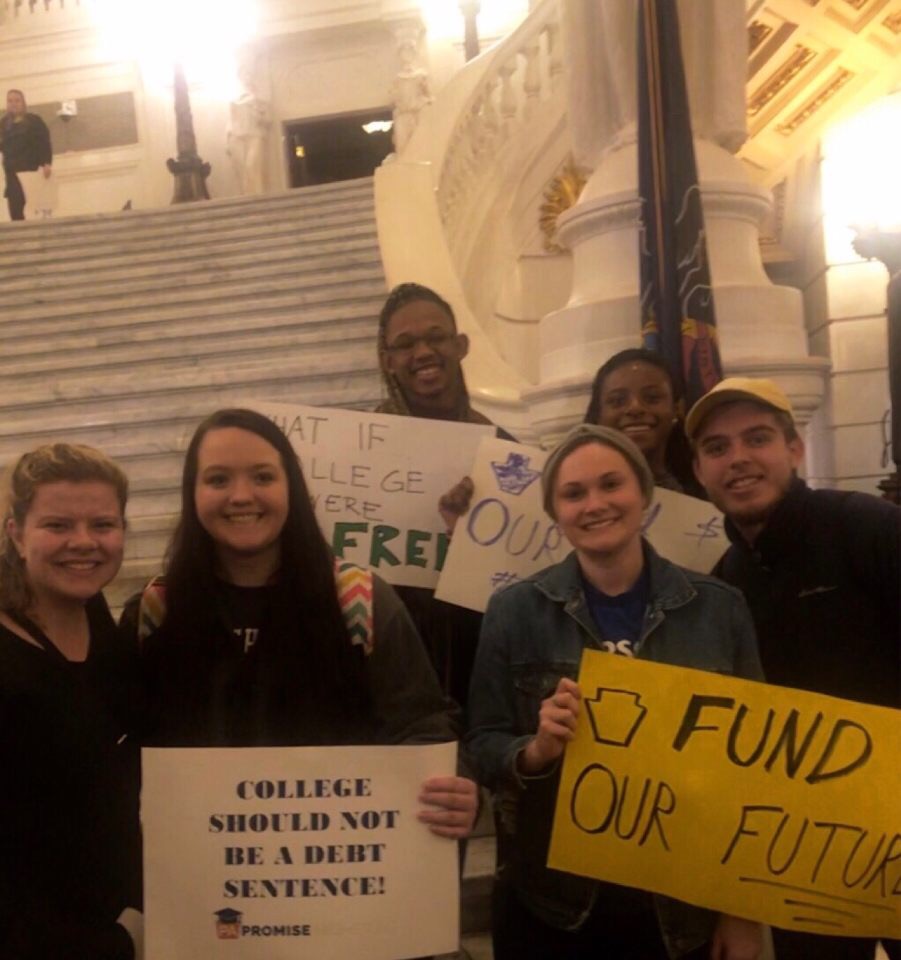Photo courtesy of Noelle Race.
“The movement for free college is dead,” expensively educated and out-of-touch pundits announce. Dead? When students at 17 and 18 must ask their families to take a heavy financial burden, beg and scrape for scholarships and grants or commit themselves to pay hundreds of dollars monthly for decades? Often two of these, or all three! This difficulty is compounded by the economy many students expect to graduate into: one of casual work, scarce full-time work and high rent. How can a movement die when debt and rent conspire to eat all your monthly income? And yet, some have chosen to celebrate the end of a movement while the problem it aims to solve only grows, much like the interest which one must pay off for years before they even touch what they actually borrowed. Someone has to stop the scrooges.
If debt dies anywhere, it certainly will not be here in Pennsylvania, which ranks highest in national student debt. Ask your professors, and even the ones who aren’t adjuncts, that paid pennies for a class have crippling levels of student debt. Each tuition hike is a future income loss for current students. Hours of your life you have to work. Each raise in interest rates is additional years of payment. The movement for free college is allegedly dead, and yet the debt continues to impact so much of our life. When students shop around for universities to attend, they not only have to worry about where they are accepted based on their “merit,” or what program fits their needs/interest; they most often must also consider price. After students graduate, they must begin loan payments, which often determines the trajectory and pace of the rest of their lives. There is hope, however, of moving towards free college.
PA Promise is a collection of bills which pushes for free tuition and fees for recent high school graduates whose families make less than or equal to $110,000 per year and are attending a four-year PA Public (PASSHE) university. It also pushes for free tuition and fees for recent high school graduates attending a two-year PA community college or four years of grants between $2,000 to $11,000 a year, depending on family income, towards a state-related four year college or university (CASSHE). It also expands grants for returning adult learners seeking “in-demand skills,” “industry-recognized credentials” and college credit. This bill is the first major push towards free college in PA in recent times.
On March 27, students, educators and legislators gathered in Harrisburg to rally for PA Promise. “Why not free college?” became Senator Vincent Hughes refrain, which echoed the general feeling among the rally-goers. In the rotunda, we were surrounded by those so deeply affected by student debt, and the only way we were going to get out of this mess was to start making noise. Vanessa Nonez, a graduating senior at Kutztown University, told the crowd of the struggle her mother went through as a Haitian immigrant for her children to attain higher education, as well as the ethics which she instilled unto her children. Vanessa reminded the crowd that PA Promise is “a path towards a human right to education.”
Clearly, free college cannot be just a dream or an impossible goal if the current state of higher education is in such an abysmal state. Through collective action, students can achieve our goals. In 2016, our professors fought and went on strike against “reforms” to increase professors’ workloads without extra pay; in support, students walked out in solidarity, and interrupted board of governors meetings. When students were tired of the xenophobia and racism from the Trump Campaign, they staged one of the largest counter-protests in the history of West Chester University. When students had enough of poverty wages and the cynical raising of tuition and fees, students rallied and campaigned across the state for the freezing of tuition and fees and a living wage. When students witnessed cops continue to be let off the hook for the murders of black and brown people, they marched and shut down campus. We have the numbers and the power.
Pennsylvania continues to be ranked among the highest in student debt. Many academic buildings are not fully accessible or meaningfully comply with the Americans with Disabilities Act Resources for marginalized students are often underfunded. Resources for sexual assault survivors are haphazard or inadequate, and Title IX often goes unenforced. We can only achieve free and accessible college-for-all through student collective action and interruption of the status-quo. Imagine what we could achieve if the students went on strike? Just a thought.
Pennsylvania Student Power Network will be collecting personal stories about student debt on the quad next Monday (April 15) and Wednesday (April 17) at 11:00 A.M., and before then at PAstudentpowerWCU@gmail.com. If you want to help out or just tell your story and get a water ice, come see us then!
Jamie Berg is a women’s and gender studies major and Aaron Gallant is a anthropology major with minoring in Latin American and Latin Studies and geography. JB823748@wcupa.edu, AG851503@wcupa.edu

